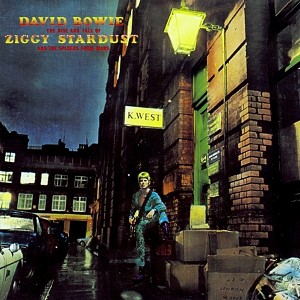I have recently started reading Moon Dust by Andrew Smith, a non-fiction book about the few men who have had the honour of walking on the surface of the moon. Somewhat serendipitously, it’s just the right book to be reading right now, because it gives you the context in which Bowie wrote this album.
Yuri Gagarin was the first man in space, in 1961. In July 1969, Apollo 11 famously took Neil Armstrong and Buzz Aldrin to the surface of the moon. Since Apollo 17 in December 1972, we’ve stayed much closer to earth, I guess because once we’d proved that it could be done, there was no point continuing to take risks when we could just send computers up instead.
David Bowie was clearly, like many others, whipped up into space frenzy during those few years. On previous albums he had tinkered with the notion of an extraterrestrial superbeing (always male, of course) making contact and either providing humankind with salvation or dashing them to smithereens. On this album, he gets it all out of his system, and it culminates in something that’s nearly, but not entirely, a rock opera on the subject.
Five Years is not my favourite song, but it sets the stage nicely, and provides the lyrical setup for the Ziggy tale. The drums sound a bit fake and nasty to my ears, but once the song gets going there’s plenty of other nice stuff to cover it up. The next song is Soul Love – I really like the rhythm here – I’m not quite sure how to describe it, it’s a sort of semi bossa nova shuffly thing. Perfect chorus, the chords and melody are exquisitely chosen.
Moonage Daydream really hooked into me from the outset. It opens with a big guitar chord but the rest of the song is actually very cleverly arranged so that no instrument steps on anothers’ toes. A bit of guitar here, a bit of piano here, some strings here, but they all get out of the way when it’s not their turn. It makes it all the easier to immerse yourself in it.
And then there’s Starman, which I’m sure you’re familiar with, and I bet you find it as hard to resist singing along with the chorus as I do. The song has a very important role in the context of the narrative, which won’t come as a surprise to you. As I’ve mentioned before, my exposure to David Bowie before starting this project was song-centric rather than album-centric, so to hear this song in its natural context really is a new and enlightening experience. Likewise with Ziggy Stardust, which comes later on in the album – another song that I thought I knew well, but only now am I understanding its true significance.
Now, Lady Stardust I’ve had to skip more than once since I started imagining Elton John playing and singing it. It does sound a bit like that. And I suppose the subsequent song, Star, also sounds a bit like Elton, but more of the Crocodile Rock and less of the Candle In The Wind, so I don’t mind it so much.
I’ve always been very keen on the energy of Suffragette City, it’s urgent and relentless (with the exception of the few moments where it does relent, which makes them all the more effective). And then the album closes with Rock & Roll Suicide which starts off with just an acoustic guitar and then swells up into something epic that shares a lots of its DNA with Cygnet Committee, which was one of my favourite finds from an earlier album, albeit packed into less than 3 minutes as opposed to more than nine.
Like last time, I’ve enjoyed listening to this album and am finding it hard to put away. If the quality stays like this, then my previous estimate of “a few weeks” for each album is going to end up being “about a month”. I’ve got no problem with this.
Hits from this album: I suppose that Starman and Ziggy Stardust would lay joint claim to that title.
My favourite song from this album: I really don’t know how to choose. Starman and Ziggy Stardust are both brilliant, I’ve always liked Suffragette City, and now I’ve discovered that I like Soul Love and Moonage Daydream quite a lot too. I’m going to pick Moonage Daydream on the basis that it has managed to grab me in curious ways.
Next up: Aladdin Sane


One of the things I enjoyed most about all those documentaries about Bowie recently was the sight of the Spiders from Mars. Bowie (and to a lesser extent Ronson) apart, they were basically just hairy-arsed musicians who had to be talked quite hard into putting all the makeup and getup on every night. They were also paid amusingly poorly too, and didn’t even realise until they compared notes with a US session player brought in to help out on the US Tour. Remarkable.
Also just watched the “classic album” programme on “Transformer” – for obvious reasons. Ronson produced the album, and Bowie was there too. There’s a lovely moment where Lou Reed sits in the studio and shuts himself out of “Perfect Day”, leaving just the arrangement, and he sits there quietly listening to it and says, “Ronson was a genius”. There’s also a nice moment where he talks about “Satellite of Love” and how music is all about details, focusing on the high notes in the chorus. He isolates them on the mixing desk, and it’s Bowie, of course. “David was the only one who could reach that high”.
Not Ziggy related, but somehow seemed appropriate to mention them here.
Love this album.
Sounds like an interesting program – I might try to track it down. There’s a clip on YouTube here.
the whole thing is on there, Pete.
here.
Ahah.